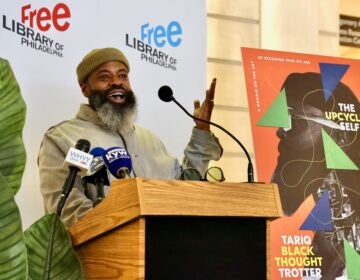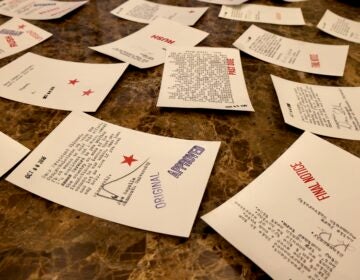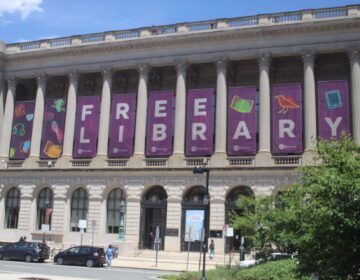Black, Southern, gay poetry collection selected for One Book, One Philadelphia
Pulitzer-winning “The Tradition” by Jericho Brown has been picked for One Book One Philadelphia, the first time the citywide reading project chose poetry.
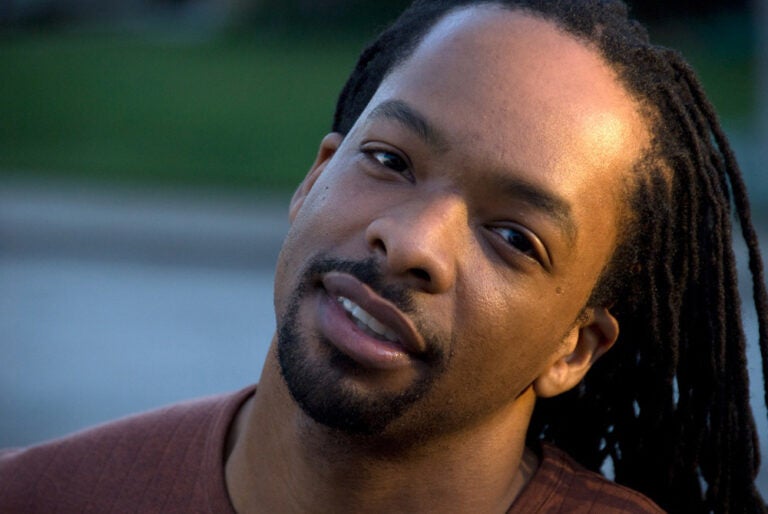
Jericho Brown, author of "The Tradition," the 2021 selection for One Book, One Philadelphia. (Courtesy of John Lucas)
For the first time in its 19 years, One Book One Philadelphia has selected a book of poetry: “The Tradition” by Jericho Brown.
The book chosen by the Free Library of Philadelphia for its annual citywide reading program was published in 2019, and won the Pulitzer Prize for poetry in 2020.
“We wanted to find a title that felt right to the moment, in recognition of the year we had, and a way forward,” said Andrew Nurkin, the Free Library’s deputy director of enrichment and civic engagement. “Poetry seemed exactly the thing we needed.”
Although written before 2020, “The Tradition” speaks directly to some of the issues that pervaded the year: violence against Black people, racial justice, and equity.
“All of the challenges we’ve faced in 2020 are not new. Demands for racial justice and police brutality didn’t begin with 2020. They are as old as the United States itself,” said Nurkin. “Part of what Brown is dealing with is the question of tradition: what traditions have we grown comfortable with, and what traditions we need to create for the future.”
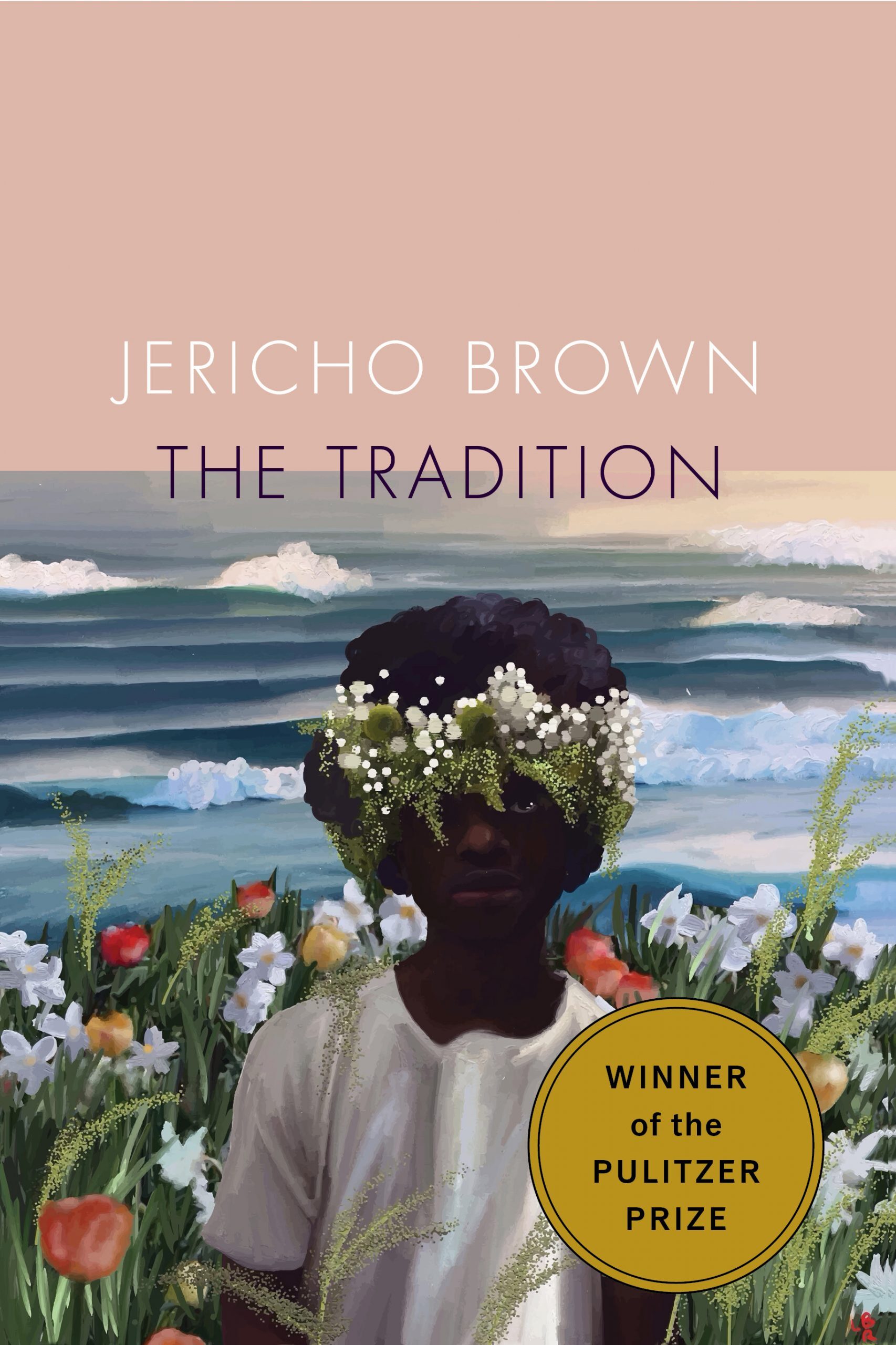
“The Tradition” will be used as the basis for a series of events, workshops, and discussions beginning in April (National Poetry Month) and lasting through June. Depending on the status of pandemic restrictions at the time, Brown plans to participate in those events either virtually or in person.
Brown — who lives in Atlanta, where he is a professor at Emory University — expressed a fondness for Philadelphia based on several visits to the city for poetry readings.
“When I think of Philadelphia, I think of people like Sonia Sanchez, whose work has been so important to me,” Brown said in a Zoom interview. “Not only her work, but her person. Part of what I’ve been trying to do as a poet is to emulate poets like Sonia Sanchez and others in the area.”
“I’d like more of a relationship,” he added. “I’d like to party there. I need to find a good nightclub once the pandemic is over.”
Brown mines his life and lineage for poetic material. He references his grandparents, who once worked as sharecroppers, and connects their experience to racial injustice today. In the title poem of “The Tradition,” Brown begins with, “We thought / Fingers in the dirt meant it was our dirt,” then later adds himself to that heritage of working the land, “Men like me and my brothers filmed what we / Planted for proof we existed before / too late.”
The poem ends with the names of three Black men who died at the hands of police: “John Crawford. Eric Garner. Mike Brown.”
“My poems are going to make use of my life experience. My life experience is that of a Black queer man from the South, who has all kinds of other identities,” said Brown. “Just as much as I am Black, I am my mother’s son, my sister’s brother. If you want to write well, you have to make use of everything you have.”
Brown addresses not only larger, structural forms of violence that Black men face in the United States, but also intimate, interpersonal violence, like his own experience of sexual assault. He also offers ample ecstasies and pleasures, as in “I Know What I Love”:
Sometimes what I love
Shows up at three
In the morning and
Rushes to turn me
Upside down …
Then, after musing on his own death, Brown concludes:
I wanted what anyone
With an ear wants –
To be touched and
Touched by a presence
That has no hands.
In “The Tradition,” Brown debuts a poetic form of his own invention, what he calls “duplex.” Duplex borrows from the ghazal — a type of poetry that originated in seventh-century Arabia and uses strings of couplets — as well as from the line cadence of the English sonnet and the lyrical repetition of blues music.
“I wanted to invent this form because I wanted poetry to move against pigeonholing. I wanted to fuse East and West, and include that rich African American form,” he said. “That’s where the need arose: to have a poem where we understand, ‘This is like my life.’”
“The Tradition” contains four poems in Brown’s duplex form, all of them named “Duplex.” Here is an excerpt from one of them:
Here is one symptom of my sickness:
Men who love me are men who miss me.
Men who leave me are men who miss me
In the dream where I am an island.
In the dream where I am an island,
I grow green with hope. I’d like to end there.
Programming for this year’s One Book, One Philadelphia will begin with an interview in April — either in person or online — between Brown and the city’s current poet laureate, Trapeta B. Mayson, followed by a series of events still being planned.
It will be a first for both the One Book program, which had never before selected a book of poetry, and for the poet, who had never before been selected for a citywide reading program.
“I’m very grateful. It’s very exciting, especially when I think about Philadelphia,” said Brown. “I feel like it’s a city I have a relationship with.”
WHYY is your source for fact-based, in-depth journalism and information. As a nonprofit organization, we rely on financial support from readers like you. Please give today.



